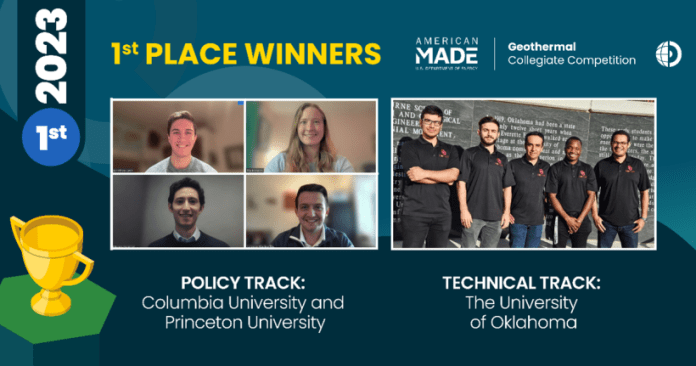Students from universities across the United States recently competed in the prestigious Geothermal Collegiate Competition of 2023, showcasing their inventiveness in renewable energy solutions. The U.S. Department of Energy proudly announced the winning teams, with Team GeoTribe from the University of Oklahoma clinching the top spot in the Technical Track. The Policy Track saw a collaborative victory from the Aurora Geothermal Solutions, representing Columbia University and Princeton University. These victorious squads gained not just recognition but also a handsome reward of $10,000 and the opportunity to engage with the community through hosted events regarding their projects.
Technical and Policy Innovations in Geothermal Energy
Principal Deputy Assistant Secretary Jeff Marootian heralded the student teams for their exemplary work. He stressed the significance of geothermal energy as a steadfast provider of heating and cooling, which operates incessantly. This year’s competition revealed the acute skills and forward-thinking of the participants, indicating a promising horizon for the nation’s clean energy future.
Participants in the Technical Track took on the task of designing practical geothermal heating and cooling systems specific to chosen communities, while those in the Policy Track, for the first time this year, delved into the intricacies of regulatory landscapes and the financial aspects of implementing geothermal systems. The teams rewarded with second place received a cash prize of $6,000 for their notable contributions.
First-Place Projects That Are Heating Up the Geothermal Scene
The University of Oklahoma ultimately won the Technical Track by devising a tailored geothermal well system. This innovative system is projected to effectively manage the temperature for a 40,000-square-foot greenhouse run by the Osage Nation. The resilient blueprint aims to tackle the trials posed by maintaining optimal growing conditions all year round, a need that became clear during the pandemic-related disruption of the Tribe’s food supply.
On the other hand, the first-place Policy Track laurels went to the Columbia and Princeton collaborative, who turned their attention to the Alaskan town of Elim. Their rigorous economic assessment of a groundbreaking ocean-based closed-loop geothermal solution spotlighted the potential for recovering installation costs in as little as 14 years, alongside substantial environmental and economic benefits for the residents.
Impressive Runner-Up Creations
Coming in second place in the Technical Track, Kyle White’s Team from the University of Tulsa impressed judges with a geothermal project targeting the heating and cooling expenses at the Lorton Performance Center, a hub for the arts at their institution. Their design involved pioneering horizontal geothermal piping installed beneath an athletic field.
From the Policy Track, the team from the University of California San Diego’s Davidson Lab proposed the ingenious use of federal incentives. Their vision revolved around rejuvenating the Boise Cascade Mill site in Idaho with a geothermal system potent enough to not just address the locality’s energy needs but also boost the job market significantly.
Empowering the Future of Clean Energy
Elisabet Metcalfe from the Geothermal Technologies Office underscored the value of the contest in offering real-world experience to students and underscored the importance of community engagement in geothermal endeavors. The competition, which has been supported for over a decade, not only emphasizes workforce development within the geothermal sector but also enriches student resumes with substantial industry experience. It stands as part of the DOE’s broader American-Made initiative, which celebrates innovation through a series of challenges and competitions.

























